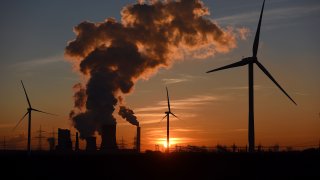
- It comes at a time when policymakers and business leaders are under intensifying pressure to deliver on promises made as part of the landmark Paris Agreement ahead of this year's COP26, due to be held in Glasgow, Scotland in early November.
- "We want to use COP26 as a focal point or as a jumping-off point to really establish a scaled, high integrity, high-quality carbon offset market for a corporate sector which is growing by the day in terms of net-zero pledges and desires to really change the shape of their emissions," Tim Adams, CEO of the IIF, told CNBC's Joumanna Bercetche.
- "So, we think the timing is right and we're moving ahead rapidly," he added.
LONDON — The chief executive of the Institute of International Finance believes there is "huge upside potential" for voluntary carbon credits, predicting the market could be worth as much as $100 billion a year by 2050.
Watch NBC6 free wherever you are
>It comes at a time when policymakers and business leaders are under intensifying pressure to deliver on promises made as part of the landmark Paris Agreement ahead of this year's COP26, due to be held in Glasgow, Scotland in early November.
The Taskforce on Scaling Voluntary Carbon Markets this week published the second phase of its blueprint on creating a large-scale and transparent carbon credit trading market.
Get local news you need to know to start your day with NBC 6's News Headlines newsletter.
>The private sector-led initiative, launched by former governor of the Bank of England Mark Carney last year, believes a broad-based carbon market is "critical" in order to limit the planet's temperature increase to 1.5 degrees Celsius above pre-industrial levels — a crucial global target outlined in the Paris Agreement.
The TSVCM says this is because it will enable more companies to turn net-zero pledges into action through investments in emissions abatement projects, where they say it will have the most impact.
"We want to use COP26 as a focal point or as a jumping-off point to really establish a scaled, high integrity, high-quality carbon offset market for a corporate sector which is growing by the day in terms of net-zero pledges and desires to really change the shape of their emissions," Tim Adams, CEO of the IIF, a trade body for the global financial industry, told CNBC's Joumanna Bercetche.
Money Report
"So, we think the timing is right and we're moving ahead rapidly," he added. Adams is a prominent sponsor of the TSVCM, a project chaired by Standard Chartered CEO Bill Winters.
'High integrity and high-quality projects'
Carbon credits, or carbon offsets, are permits that allow a company to emit a certain amount of greenhouse gases. They are designed to create a financial incentive for heavy emitting businesses to pollute less.
The voluntary carbon offset market differs from cap-and-trade schemes, such as Europe's flagship Emissions Trading System, with the latter setting a finite carbon budget that allows emitters to trade allowances.
In the voluntary market, however, companies are typically likely to be trying to meet internal targets to reduce their carbon footprint.
Critics of carbon offsets say they allow businesses to continue to release greenhouse gases, while environmental groups such as Greenpeace UK and the Wildlife Trusts argue previous experience shows that even progressive corporates have failed to deliver on their commitments.
The TSVCM says it is essential that any use of carbon credits that form part of corporate climate commitments is done through "high integrity and high-quality projects."
"I think there's a huge upside potential," the IIF's Adams said, noting that one of the major challenges of the initiative would be to bring a 30-year-old market into the 21st century.
He anticipated the formation of a number of trading hubs worldwide over the next five years and predicted demand would "skyrocket."
"The McKinsey report, the one that we put out, estimates that we could see a 10-fold increase," he continued. "I think this is a $100 billion a year market by 2050 — and we're just at the leading edge of that."
The TSVCM has previously said scaling up the voluntary carbon market would need to grow 15-fold to meet the climate goals set under the Paris accord, and could be worth as much as $50 billion by the end of the decade.






